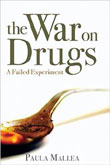Drug Decriminalization is Coming to Canada
Brandon Sun, March 29, 2021 –
David McConkey
Let’s define our terms. There is a range of approaches to dangerous substances. At one end is legalization and regulation. This is how we deal with alcohol, tobacco, cannabis and pharmaceutical drugs. At the other end is prohibition and criminalization. This is how we deal with drugs like illicit opioids, cocaine, methamphetamine and heroin.
Between those two ends is a zone that can be fuzzy and includes decriminalization. With decriminalization, these drugs are still illegal. But possessing small amounts of drugs either is ignored by the police or carries only a minor penalty.
To visualize drug decriminalization, think of possessing a small amount of drugs as being like jaywalking or parking your car at an expired meter. As the misbehaving pedestrian or driver, you are breaking the law. But even if the police are there, you won’t go to jail or get a criminal record. The police might look away or they might give you a warning or a fine.
The case for decriminalization or legalization of all drugs has been building for some time. The War on Drugs has proven to be a massive failure; more leaders are now ready to admit it. There are more examples of success from here and around the world. These include recent cannabis legalization in Canada and two decades of drug decriminalization in Portugal. And the pandemic and an upsurge in drug overdose deaths have created a readiness to try new approaches.
One point must be made clear. There is no ideal solution to dangerous drugs. At best, we can reduce the harm being caused. Look at alcohol. We have gone from prohibition to legalization and we have initiated programs in research, education, prevention and treatment. Yet we still don’t know why some people become alcoholics, how to prevent some folks from problem drinking or the best way for treatment.
I think most members of the public would be surprised to read the recent report from the Canadian Association of Chiefs of Police, which recommends decriminalizing the possession of small amounts of drugs. The report notes that the decision to lay drug charges is up to police discretion. Police frequently decide the best action is not to lay charges. As the police chiefs state: “Merely arresting individuals for simple possession of illicit drugs has proven to be ineffective.”
Police in Canada have already implemented much drug decriminalization, notably in Vancouver (and more generally throughout B.C.) and also on an ad hoc basis across the country. Nationally, the police chiefs acknowledge that “the application of the law is inconsistent.”
We also have drug decriminalization in the vicinity of supervised drug consumption sites. At these places, individuals can use illegal drugs in a clean environment and staff are in attendance to assist if things go awry. This program requires an agreement with local police: people who are on their way to a drug consumption site will not be arrested. There are now about 50 of these sites in Canada, almost double from a year before. From B.C. to Quebec, supervised drug consumption sites are in every province – except Manitoba.
The police chiefs point out that simply refraining from arresting those who are addicted to drugs is not enough. There must be much more done to help. Possibilities include steering people toward treatment programs and supplying pharmaceutical-grade medications as an alternative to unsafe street drugs. The police chiefs note that expanding services would not be cheap, but would be worth the investment.
Both the Harper and Trudeau governments have resisted calls to decriminalize drugs. But viewing drugs as a health concern rather than a legal matter is now widely seen as making sense. The police chiefs point out that decriminalization combined with other measures “has led to an increase in treatment uptake, a reduction in drug-related deaths, and importantly, no increase in drug use rates.”
Drug decriminalization has already begun in Canada. We citizens should understand this reality and be ready to encourage the formal decriminalization and / or legalization of all drugs. We must insist that our political and law enforcement leaders be more forthcoming in discussing this crucial issue. And we must insist that necessary resources be allocated to make these drug policy changes comprehensive and successful.
The post-pandemic era could be a time of reevaluation of the past and of renewal for the future. Changes in drug policy could be part of this renaissance.
*
* * *
See also: Reflections on the War on Drugs
Review – The War on Drugs: A Failed Experiment
End the War on Drugs and Find a Better Solution
Drug Policies Require More Humility, Less Virtue Signaling
War on Drugs No Easy Battle
QUICK CONTACT:
David McConkey,
Brandon, Manitoba
Send me an email
My Sites / Interests
- Citizen Active
- Columns
- The Great War
- Live Well, Do Good
- Manitoba History
- Obituary Guide
- Reviews
- The War on Drugs
Some Reviewed Books:
The War on Drugs:
A Failed Experiment

The Atheist Muslim:
A Journey from Religion to Reason

Stranger Than We Can Imagine:
An Alternative History of the 20th Century
Heretic:
Why Islam Needs a Reformation Now
Islam and the Future of Tolerance:
A Dialogue

Extraordinary Canadians:
Nellie McClung

The Greatest Show on Earth:
The Evidence for Evolution



